|
|
|
Sort Order |
|
|
|
Items / Page
|
|
|
|
|
|
|
| Srl | Item |
| 1 |
ID:
140223
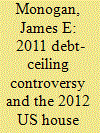

|
|
|
|
|
| Summary/Abstract |
This article considers how a key legislative vote—that is, the August 2011 vote to raise the federal debt ceiling—influenced the 2012 elections for the US House of Representatives. Two outcomes are analyzed: (1) the incumbents’ ability to retain their seats through the 2012 general election, and (2) their share of the two-party vote for members who faced a general-election competitor. In developing this study, the research design was registered and released publicly before the votes were counted in 2012. Therefore, this article also illustrates how study preregistration can work in practice for political science. The findings show that seat retention did not vary with the treatment; however, incumbents who voted against raising the debt ceiling earned an additional 2.4 percentage points of the two-party vote.
|
|
|
|
|
|
|
|
|
|
|
|
|
|
|
|
| 2 |
ID:
145099
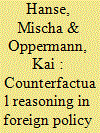

|
|
|
|
|
| Summary/Abstract |
The abstention of the conservative-liberal government under Chancellor Angela Merkel on UN Security Council resolution 1973 marked the first occasion in which the Federal Republic of Germany stood against all three of its main Western partners, the US, France, and the UK, simultaneously, on a major foreign policy issue. Many accounts of this decision invoke the influence of electoral incentives. What is problematic, however, is that the causal weight attached to electoral politics is often left ambiguous and difficult to assess with traditional case study methods. The article, therefore, employs counterfactual reasoning to scrutinize “electoral politics” explanations of Germany's policy on Libya. Specifically, it develops counterfactuals in which decision making did not take place in the shadow of upcoming elections and investigates how other variables on different levels of analysis would have shaped decision making in the counterfactual scenarios. The findings suggest that electoral incentives did not decisively shift German foreign policy on Libya. More generally, the article speaks to the value of counterfactuals in foreign policy analysis.
|
|
|
|
|
|
|
|
|
|
|
|
|
|
|
|
| 3 |
ID:
139669
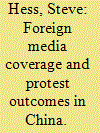

|
|
|
|
|
| Summary/Abstract |
By looking at the case of the 2011 Wukan rebellion in Guangdong Province, the following article explores the role played by foreign media in influencing the protest’s ultimate outcome: an intervention from above by provincial authorities in favour of the villagers. Placing Wukan into a four-level model incorporating local, provincial, national, and international dimensions, this article considers howWukan might serve as a model for contention that may influence future acts of popular protest in China in the digital age. It suggests that while appealing directly to foreign media can help claimants increase their leverage over local officials and prompt interventions from above, such actions are likely to modify and accelerate, but not fundamentally transform, existing patterns of localized, community-specific acts of contention seen earlier in the Reform Era.
|
|
|
|
|
|
|
|
|
|
|
|
|
|
|
|
| 4 |
ID:
172927


|
|
|
|
|
| Summary/Abstract |
In the wake of the Arab Spring, many younger members of the Muslim Brotherhood in Jordan left the movement, especially after 2015, establishing new political parties due to ideological shifts over the nature of the state and questions of civil liberties. Four factors influenced this transformation: identity crisis, the movement's organizational rigidity, members' personal experiences during and after the uprisings, and a growing desire to separate political campaigning from religious outreach.
|
|
|
|
|
|
|
|
|
|
|
|
|
|
|
|
| 5 |
ID:
139832
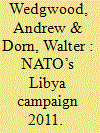

|
|
|
|
|
| Summary/Abstract |
Colonel Muammar Qaddafi’s violence against the Libyan population in the face of a fledgling rebellion in March 2011 prompted an international intervention. The United Nations Security Council authorised the use of ‘all necessary measures’ to protect civilians and enforce a no-fly zone. Following a preliminary American-led military intervention, the North Atlantic Treaty Organisation sponsored a seven-month campaign, ‘Operation Unified Protector.’ Was the operation ethically justified? Through the lens of the Just War tradition, seven moral principles are assessed in both qualitative and quantitative fashion. The analysis applies the novel Just War Index to the 2011 case concluding that it exhibited a moderate degree of justness overall. Still, significant flaws and ethical problems emerged. While high evaluations were made of just cause, legitimate authority, last resort and right conduct, lower assessments were given for right intent, net benefit, and proportionality of means. The outcome of the intervention is still unknown, but the broad outlines of a moral assessment are distinguishable.
|
|
|
|
|
|
|
|
|
|
|
|
|
|
|
|
| 6 |
ID:
141799


|
|
|
|
|
| Summary/Abstract |
Despite the continuing growth of internet use in Russia, there remains little systematic analysis of online election campaigning. This article presents an in-depth, multi-method analysis of party and candidate online activity during the 2011 State Duma election campaign—arguably Russia's first ‘internet election’—to ascertain the extent to which new social media is changing politics in Russia. The main findings indicate that the internet did indeed help to level the competitive playing field during the election campaign period, but despite the growing number of internet users, the overall level of online engagement remained weak.
|
|
|
|
|
|
|
|
|
|
|
|
|
|
|
|
| 7 |
ID:
151319
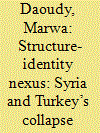

|
|
|
|
|
| Summary/Abstract |
The relation between Syria and Turkey transformed from enmity in the 1990s to détente in the early 2000s, grew into amity after the rise to power of the Turkish Justice and Development Party (AKP, Adalet ve Kalkinma Partisi) in 2002, and reverted to enmity in the aftermath of the Arab Spring. This research suggests that a combination of structural and identity-based factors, at regional and domestic levels, induced the collapse of the decade-long amity. This paper builds on the notion of a “structure-identity nexus”; and determines the orientation of foreign policy outcomes from the 1990s until 2011. The discussion outlines the merits of a hybrid theoretical perspective by elaborating on Barkin’s idea of ‘realist constructivism’, which draws on two rival traditions, realism and constructivism. The structure-identity framework explains the double transformation in the relationship, considering the return to inter- and intra-state conflict in 2011. The research draws on extensive primary and secondary sources, as well as interviews carried out with key figures. In addition to the relationship between Syria and Turkey, the structure-identity nexus provides potential broader explanations that fuel the shift from amity to enmity in the complex network of states found in the Middle East.
|
|
|
|
|
|
|
|
|
|
|
|
|
|
|
|
|
|
|
|
|